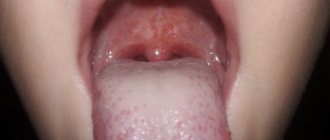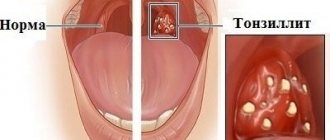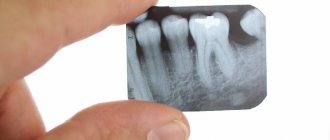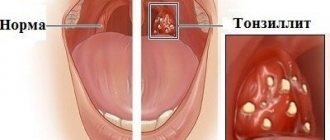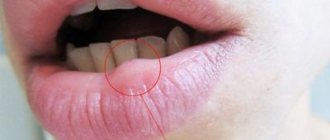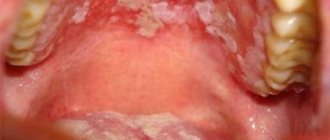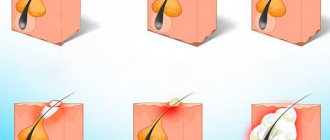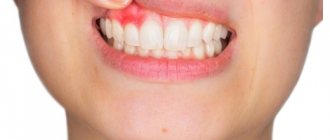This article describes all the possible causes of the appearance of bubbles in the mouth on the mucous membrane and effective methods of treating the resulting pathology.
The first sign that allows you to suspect the occurrence of a formation in the mouth is the sensation of a foreign object.
Depending on its location, the bubble will cause various symptoms:
- Pain when chewing food if the bubble is located on the gums or tongue.
- Pain when talking or smiling occurs when a bubble appears on the inner surface of the lips.
- Pain and the sensation of a fish bone stuck in the throat occurs if the bubble is located at the root of the tongue, in the oropharynx or in the upper part of the larynx.
If you look at the neoplasm, you can see and evaluate the nature of the changes in the tissue:
- An elevation above the level of the mucosa in the form of a tubercle.
- Redness around the raised area.
- Swelling of the tissue around the elevation.
The 3 above signs are often signs of an inflammatory process and require careful monitoring of the course of the disease in order to promptly and correctly prescribe treatment.
It is worth noting that the bubble can be not only inflammatory in nature. If the formation of a vesicle and its presence are not accompanied by pain, redness, or swelling of the mucosal tissue, then the cause of the vesicle is not an inflammatory process, which narrows the range of possible causes and radically changes the direction of treatment.
In this case, you need to contact a dermatologist who will assess your health. In this case, treating yourself is dangerous to your health.
Bumps in the mouth: what they are, their causes and treatment
Any neoplasms in the oral cavity require careful study of the clinical picture. This can be either a harmless growth or an alarming signal from the body. Thus, a lump on the roof of the mouth often occurs as a result of a cold or infection. This formation does not cause discomfort and resolves on its own after strengthening the immune system. If the growth is accompanied by pain and other unpleasant symptoms, this may indicate a serious pathology. Only a doctor can determine the cause of the lump and tell you what to do.
The mechanism of formation of a blood bubble on the oral mucosa
Bloody blisters in the mouth in most cases are not life-threatening. They are formed as a result of mechanical damage to the mucous membrane. When microtrauma occurs, harmful microorganisms attack the damaged area.
After this, a number of responses are activated in the human body:
- The immune system is activated. Monocytes and leukocytes, as well as macrophages, instantly arrive at the damaged area, attacking the harmful pathogen and quickly destroying it.
- Immune cells die. This is a signal for other cells and substances are released in the affected area that are mediators of inflammation of the mucous membrane - serotonin, histamine and bradykinin.
- These substances cause a strong spasm of the circulatory system and the outflow of blood is hampered. After the spasm is relieved, all accumulated blood immediately flows to the site of inflammation. It moves at high speed and under pressure. A detachment of the mucous membrane occurs in the mouth, and a bloody blister appears.
Why do bumps appear in the sky?
A growth in the mouth appears as a result of blockage of blood vessels and stagnation of organic fluids, which causes inflammation in the mucosal tissues. Among the most common causes of pathology are the following:
- bad habits – alcohol abuse and smoking;
- chronic diseases – sore throat, sinusitis;
- constant exposure to traumatic factors - incorrectly fitted crowns that become infected, eating too hot food, sucking on lollipops, etc.;
- insufficient oral hygiene - food remains behind the teeth become a favorable environment for the development of pathogenic microflora;
- inflammation of the salivary glands;
- colds and infectious diseases;
- Doctor’s mistakes – incorrect filling or tooth extraction.
A child can also develop a lump in the mouth. In most cases, the pathology occurs due to bruises, which are quite common in childhood.
Bumps also form in the mouth due to cancer (leukoplakia and papillomatosis), which pose a great danger to human health and life.
General symptoms
A tumor formed in the oral cavity can be of different colors: white, dark red, blue, transparent yellow. Sometimes it is soft, in other cases it is dense. A lump that appears against the background of one pathology may differ depending on the individual characteristics of the patient’s body: age, general condition of his body, bad habits, etc.
The lump appears in the form of a bubble, growth, ball, compaction, tumor with faint edges. Spots (change in color of the mucous membrane) may also form in the affected area. In some cases, numbness is felt in a certain part of the oral cavity, difficulties appear when swallowing, and the voice changes. In advanced forms of the disease, the cones may be damaged, which provokes bleeding with an unpleasant taste and odor.
Painful lumps indicate inflammation and suppuration. General health worsens, body temperature may rise. Purulent intoxication of the body occurs. In this case, the lump grows, it becomes hard and hot, and the regional lymph nodes enlarge.
Treatment options
To treat blisters of the first group, broad-spectrum antibiotic therapy is used. The purpose of this treatment is to combat the cause of the disease, which is often microorganisms inside the human body.
For local treatment, it is better to use solutions of furatsilin, a weak solution of manganese.
They cause a disease, one of the symptoms of which is damage to the oral cavity. In such cases, in addition to local damage, there will be symptoms of general intoxication, enlarged lymph nodes, and sometimes a rash in other places on the skin.
A good addition to general treatment is the use of local anesthetic, disinfectant and antiseptic solutions for the oral cavity. They will quickly eliminate the symptoms of inflammation and pain, which will improve your well-being.
To treat group 2 blisters, it is better to use only topical medications. This will reduce possible side effects of general medications and ensure a quick recovery.
If it is not possible to purchase a solution of manganese and furatsilin, you can simply use soda-salt solutions, which do an excellent job against staphylococci and streptococci. It is these bacteria that often cause most inflammatory processes in the oral cavity.
For herpes infection, it is better to use combined antiviral treatment, which consists of ointments, tablets and vitamins.
Diagnosis of diseases accompanied by the formation of lumps in the mouth
Tumors have appeared in the mouth, and the question is, which doctor should I contact? This symptom is a prerequisite for visiting the dentist. To diagnose the disease, the doctor will first conduct a visual examination and palpation, and collect an anamnesis. A puncture is taken from the resulting lump and a bacteriological examination is carried out, which makes it possible to determine the cause of its occurrence.
Based on the results obtained, the doctor determines the need to use other diagnostic methods:
- general tests;
- X-ray;
- Ultrasound;
- biopsy.
If the cause of the formation of a lump on the upper palate is beyond the scope of the dentist’s competence, the patient is prescribed consultations with other specialists (pediatrician, therapist, gastroenterologist, endocrinologist, hepatologist). Only after making a diagnosis will the doctor determine how to treat the disease.
What to do if a bubble is detected?
- Determine the appearance of the formation.
- Guess the time of its occurrence.
- Suggest the reason for its occurrence.
- Treat the oral cavity with local antiseptic preparations 4-5 times a day.
- After 12-16 hours, evaluate the effect of antiseptics, and if the result is positive, continue treatment. If the result is negative, seek medical help.
You should not neglect treatment in such a delicate problem, since a person is a social creature and his appearance can greatly influence his fate.
Dental diseases
At an advanced stage of periodontitis, a fistula forms near the tooth involved in the painful process. If periostitis (inflammation of the periosteum) develops, flux may appear. At first the lump is hard, but over time it becomes softer and filled with pus.
In case of periodontitis, the tooth is unfilled and the root canals are cleaned. After removing the exudate, oral baths are prescribed using special solutions. In case of periostitis, the dentist opens the tooth, places medications in the cavity, and closes it with a temporary filling. If this treatment does not help, the tooth is removed.
Treatment methods depending on the cause:
- If the formation occurs due to a viral infection, then treatment will be based on the use of antiviral drugs;
- If the cause is injury, then it is necessary to eliminate the consequences and rinse the mouth with antiseptics;
- If an allergic reaction provokes an illness, then you should find out what the irritant is and not use it anymore. The doctor will also prescribe antihistamines;
- If a large bloody bubble has formed, then surgery is performed. After this, the doctor prescribes medications for rapid tissue regeneration and restoration.
Angioma
It is a benign formation, which in most cases is a congenital pathology in children. It consists of blood vessels and is dark red in color. Sometimes it looks like a small ball on a leg. Lymphangioma, formed from lymphatic vessels, most often appears on the soft palate. It looks like a small bump with a bubbly surface. First, the tumor grows inside, then a swelling appears that hurts.
The choice of treatment method depends on the type of vessels. The angioma is removed or reduced by sclerotherapy, alcohol injection, or radiation therapy. If there is a risk of severe swelling, the formation is excised with a scalpel. The ball-shaped angioma is removed using a galvanoacoustic loop.
Preventive measures
To reduce the risk of developing pathologies in the oral cavity, you should follow a number of recommendations:
- quit smoking and alcohol;
- normalize nutrition - do not eat hot, salty and spicy foods, introduce fermented milk and plant products into the diet;
- carefully and regularly observe oral hygiene;
- start treatment of any pathologies in a timely manner;
- Take vitamin complexes periodically (after consultation with your doctor).
If you experience the slightest discomfort in the palate, you should see a dentist. Paying attention to your health prevents the development of complications.
Experts' opinion
Research conducted at the Kazan State Academy has determined that the use of preparations from the Asepta line (gels, balms, toothpastes, rinses) increases the effectiveness of treatment of chronic catarrhal gingivitis and other inflammations, mild and moderate chronic periodontitis, hyperesthesia of hard dental tissues, which together significantly reduces the duration of treatment and increases the duration of remission in this category of patients.
Sources:
- The use of drugs from the Asepta line in the complex treatment of inflammatory periodontal diseases (N.V. Berezina E.N. Silantyeva S.M. Krivonos, Kazan State Medical Academy. Kazan.) N.V. BEREZINA, E.N. SILANTIEVA, S.M. KRIVONOS Kazan State Medical Academy
- https://cyberleninka.ru/article/n/sovremennye-lechebno-profilakticheskie-sredstva-dlya-individualnoy-gigieny-polosti-rta Silantieva E.N., Berezina N.V., Krivonos S.M. Complex treatment of chronic recurrent aphthous stomatitis using drugs from the Asept line, Practical Medicine journal
- Clinical and laboratory assessment of the influence of domestic therapeutic and prophylactic toothpaste based on plant extracts on the condition of the oral cavity in patients with simple marginal gingivitis. Doctor of Medical Sciences, Professor Elovikova T.M.1, Candidate of Chemical Sciences, Associate Professor Ermishina E.Yu. 2, Doctor of Technical Sciences Associate Professor Belokonova N.A. 2 Department of Therapeutic Dentistry USMU1, Department of General Chemistry USMU2
- Clinical studies of antisensitive toothpaste “Asepta Sensitive” (A.A. Leontyev, O.V. Kalinina, S.B. Ulitovsky) A.A. LEONTIEV, dentist O.V. KALININA, dentist S.B. ULITOVSKY, Doctor of Medical Sciences, Prof. Department of Therapeutic Dentistry, St. Petersburg State Medical University named after. acad. I.P. Pavlova
- The role of anti-inflammatory rinse in the treatment of periodontal diseases (L.Yu. Orekhova, A.A. Leontyev, S.B. Ulitovsky) L.Yu. OREKHOVA, Doctor of Medical Sciences, Prof., Head of Department; A.A. LEONTIEV, dentist; S.B. ULITOVSKY, Doctor of Medical Sciences, Prof. Department of Therapeutic Dentistry of St. Petersburg State Medical University named after. acad. I. P. Pavlova
- Report on clinical trials of anti-inflammatory balm for gums "Asepta" adhesive, St. Petersburg State Medical University, 2007

